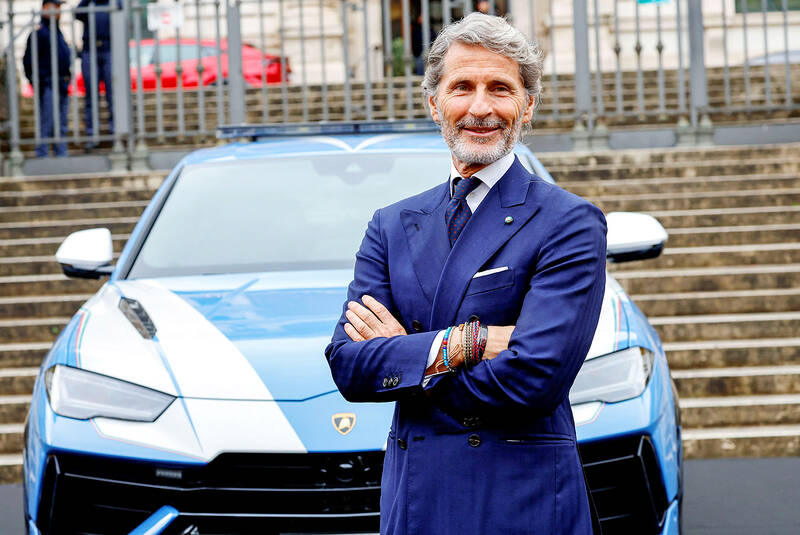Lamborghini SpA is holding off for now on making its roaring sports cars fully electric, as skepticism around the technology grows.
While performance would not be an issue in an electric vehicle, some emotional aspects — such as the sound of the Huracan’s V10 engine — cannot be replicated, Lamborghini CEO Stephan Winkelmann said.
The Volkswagen AG-owned brand also remains open to use e-fuels if regulation becomes more favorable, he said.

Photo: Remo Casilli, Reuters
Fully electric sports supercars “is not something that is selling so far,” Winkelmann said in an interview.
“It’s too early, and we have to see down the road if and when this is going to happen,” Winkelmann added.
It is a tense time in the high-end automotive sector, which is deliberating on how to deal with the regulatory pressure to lower emissions, as demand for electric vehicles slows and governments scale back subsidies for the technology.
Mercedes-Benz Group AG has stopped development of separate underpinnings for electric luxury sedans to save money and plans to sell vehicles running on gasoline longer than expected.
Lamborghini’s rival, Ferrari NV, is further along in its electrification push.
Next month, it plans to open a factory that would make hybrid and electric supercars in Maranello, Italy.
Its first fully electric model is due next year.
BYD Co (比亞迪) has beaten both to the punch after unveiling a 1.68 million yuan (US$236,910) electric sports car in February.
The Yangwang U9 would initially be sold only in China, where Lamborghini’s exposure is “limited,” Winkelmann said.
Lamborghini has had success selling plug-in hybrids, including the Revuelto sports car, but its first fully electric model — the two-door Lanzador crossover — would not arrive until 2028.
Still, the company is overhauling its supply chain and production to produce Lamborghinis with 40 percent fewer carbon dioxide emissions by 2030, Winkelmann said.
When it comes to synthetic fuels, the brand is benefiting from work at Porsche, another luxury auto maker in Volkswagen’s portfolio.
E-fuels could come into greater focus in two years, when the EU reviews its plan to effectively ban new combustion engine car sales by 2035.
“There might be an opportunity if things change,” Winkelmann said.

Merida Industry Co (美利達) has seen signs of recovery in the US and European markets this year, as customers are gradually depleting their inventories, the bicycle maker told shareholders yesterday. Given robust growth in new orders at its Taiwanese factory, coupled with its subsidiaries’ improving performance, Merida said it remains confident about the bicycle market’s prospects and expects steady growth in its core business this year. CAUTION ON CHINA However, the company must handle the Chinese market with great caution, as sales of road bikes there have declined significantly, affecting its revenue and profitability, Merida said in a statement, adding that it would

RISING: Strong exports, and life insurance companies’ efforts to manage currency risks indicates the NT dollar would eventually pass the 29 level, an expert said The New Taiwan dollar yesterday rallied to its strongest in three years amid inflows to the nation’s stock market and broad-based weakness in the US dollar. Exporter sales of the US currency and a repatriation of funds from local asset managers also played a role, said two traders, who asked not to be identified as they were not authorized to speak publicly. State-owned banks were seen buying the greenback yesterday, but only at a moderate scale, the traders said. The local currency gained 0.77 percent, outperforming almost all of its Asian peers, to close at NT$29.165 per US dollar in Taipei trading yesterday. The

RECORD LOW: Global firms’ increased inventories, tariff disputes not yet impacting Taiwan and new graduates not yet entering the market contributed to the decrease Taiwan’s unemployment rate last month dropped to 3.3 percent, the lowest for the month in 25 years, as strong exports and resilient domestic demand boosted hiring across various sectors, the Directorate-General of Budget, Accounting and Statistics (DGBAS) said yesterday. After seasonal adjustments, the jobless rate eased to 3.34 percent, the best performance in 24 years, suggesting a stable labor market, although a mild increase is expected with the graduation season from this month through August, the statistics agency said. “Potential shocks from tariff disputes between the US and China have yet to affect Taiwan’s job market,” Census Department Deputy Director Tan Wen-ling

UNCERTAINTIES: The world’s biggest chip packager and tester is closely monitoring the US’ tariff policy before making any capacity adjustments, a company official said ASE Technology Holding Inc (日月光投控), the world’s biggest chip packager and tester, yesterday said it is cautiously evaluating new advanced packaging capacity expansion in the US in response to customers’ requests amid uncertainties about the US’ tariff policy. Compared with its semiconductor peers, ASE has been relatively prudent about building new capacity in the US. However, the company is adjusting its global manufacturing footprint expansion after US President Donald Trump announced “reciprocal” tariffs in April, and new import duties targeting semiconductors and other items that are vital to national security. ASE subsidiary Siliconware Precision Industries Co (SPIL, 矽品精密) is participating in Nvidia